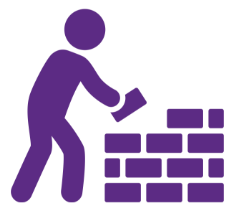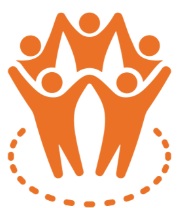Developmental Disabilities (DD) Waivers
Navigating the waiver system can feel overwhelming, but on this page, we break down the different types of DD waivers and each step to apply for them. DD waivers are resources for people with developmental disabilities and include supports for their families. Waiver applicants' parent's income does not count against them.
The Virginia Administrative Code has a specific
definition of developmental disability, which is: a permanent disability that impacts physical and/or mental abilities other than a mental illness. The disability must have occurred before someone turns 22 years old, and it must cause functional limitations in 3 or more of the following areas for adults and 2 or more for children: self-care, receptive and expressive language, learning, mobility, self-direction, capacity for independent living, or economic self-sufficiency. To be diagnosed with DD, a person’s disability must result in a need for specialized services, individualized supports, or other forms of assistance.
The 3 DD Waivers

Building Independence
Building Independence is for adults 18 years and older who can live mostly independently. They do not need supports all the time. People with this waiver usually own, lease, or control their own living arrangements and supports are complemented by non-waiver-funded rent subsidies.

Family and Individual Supports
Family & Individual Support is available to both children and adults. People with this waiver may live with their family, friends, or in their own homes. Some people may need functional, behavioral, or medical supports.

Community Living
Community Living is available to both children and adults. People with this waiver usually require supports in their homes all the time. Some people may need to live in a home that has staff to support them with functional skills and/or complex medical and/or behavioral needs.
Steps to Apply for the DD Waivers
Below is a step-by-guide to applying for waivers. Get everything you do in each step in writing with hard copies and/or follow-up emails! Get copies of every assessment and review them to make sure the information about you/your loved one is right before going to the next step.
Step One
To Get Started: Contact your local Community Services Board(CSB) or Behavioral Health Authority(BHA). Ask for a screening for the Developmental Disability Waiver.
Disability Documentation: Provide the CSB/BHA with proof of your developmental disability. (Psychological evaluations, medical reports, disability evaluations, OT, PT, ST records etc.). If you do not have documentation, the CSB/BHA may help you get an evaluation.
This is a good time to contact The Arc of Virginia for assistance with the process. Call (804) 649-8481 x 104 or Email Info@TheArcofVA.org
Step Two
Functional Criteria: The CSB/BHA will assess your functional abilities for every day activities such as bathing, mobility, communication, learning etc.
The VIDES screening is used to determine if a person meets the functional criteria.
Prepare for the VIDES in advance by reviewing it so you know what to report.
Describe what kind of help you/family member needs as if you/they have NO supports. No family, friends or staff available to help with daily activities.
Get a copy of your VIDES and review it to make sure it is accurate. If you have questions or information to add contact your CSB/BHA.
When you meet the Disability Documentation and the Functional requirements, then you will be placed on the needs based Wait List. It is not a chronological(numbered) waiting list.
Step Three
Priority Needs Checklist: The CSB/BHA staff will assess your situation with you to establish your Priority Needs Checklist Level of 1, 2, or 3 on the Wait List.
****You or your family member/primary caregiver should discuss the family/caregiver's situationwith the CSB/BHA. "Situations" may include health, other caregiving responsibilities, etc. that impact the person's ability to provide care . It is very important to be honest about your/your loved ones' needs! It can feel negative, but these waivers make the world fairer for you. You are not criticizing yourself; you are sharing how the world IS NOT working for you.
Contact your case manager/support coordinator when your support needs change or you move. Your priority level may change as your needs change. Get a copy of your Priority Needs Checklist and make sure it is correct.
Step Four (for Priority One)
For people who are in Priority Level One, the CSB/BHA case manager/support coordinator will assess their needs using the Critical Needs Summary. Your assessment will result in a score that determines how urgent your needs are and whether you will be presented to the Waiver Slot Assignment Committee. There is not a certain score you are aiming for; it all depends on who else in your CSB/BHA is in Priority Level One with you.
The Critical Needs Summary is reviewed and updated every year and whenever your needs change which may result in a different priority needs score. It is important that you contact your case manager/support coordinator whenever your needs change and when your contact information changes. Keep a copy of your Critical Needs Summary.
Step Five
Slot Assignment Review Form: When waiver slots are available, those with the highest priority needs score on the Critical Needs Summary in your CSB/BHA, are considered for a waiver.
If you are in the group of people with the highest scores, then your case manager/support coordinator will prepare a written summary of your needs and situation on the Slot Assignment Review Form. Discuss the information requested on the Slot Assignment Review Form with your case manager/support coordinator. Get a copy of your form.
Waiver Slot Assignment Scoring Summary: Individuals who are in the group of those with the highest scores in the CSB/BHA, are reviewed by the Waiver Slot Assignment Committee. The Committee reviews the anonymous Slot Assignment Review Forms. The Waiver Slot Assignment Committee scores each individual on the Waiver Slot Assignment Scoring Summary to determine those with the greatest needs to receive waivers.
While You Wait
There are different lengths of time people will have to wait to receive a waiver slot and services, and we know some needs cannot wait. Below are some resources you can explore while you wait for your DD waiver services:
- CCC Plus Waiver - Some people on the DD Waiver waitlist may also qualify for the CCC Plus Waiver. If they do, they can receive services through CCC Plus while they wait for a DD Waiver.
- Peer Mentoring - Peer Mentoring is the only DD Waiver service available to people on the waiting list.
- Department for Aging and Rehabilitative Services (DARS)– DARS offers a wide range of employment and disability-related services, including support for job seekers with disabilities. Youth with disabilities can begin accessing pre-employment transition services (Pre-ETS) starting at age 14 to help prepare for life after high school.
- The Individual and Family Support Program (IFSP) provides funding for those on the wait list for the Developmental Disability Waiver Program. Check frequently for updates on the website for VA Dept. of Behavioral Health and Developmental Services.
- Housing Options and Flexible Funds are available to those 18 years and older who are on the Developmental Disability (DD) waiver waiting list or receiving DD Waiver services.
- Centers for Independent Living (CIL) offer a variety of services and supports for youth and adults with disabilities. Locate the CIL in your area.
- REACH is a crisis program for people of all ages with developmental disabilities and mental or behavioral health needs. It offers prevention, intervention, and stabilization support. Anyone with a developmental disability—whether they have a DD Waiver or not—can ask for REACH services.


Emergency Waivers
To be eligible for an emergency waiver, a person must meet at least one of the following criteria
- Child protective services has substantiated abuse or neglect against the primary caregiver and has removed the individual from the home; or for adults where (i) adult protective services has found that the individual needs and accepts protective services or (ii) abuse or neglect has not been founded, but corroborating information from other sources (agencies) indicate that there is an inherent risk present and there are no other caregivers available to provide support services to the individual.
- Death of primary caregiver or lack of alternative caregiver coupled with the individual's inability to care for himself and endangerment to self or others without supports.
- An individual who transitioned from one of the DD Waivers to the Medicaid Works program who chooses to resume DD Waiver services.
To request an Emergency waiver, go to your Community Services Board or Behavioral Health Authority.
Reserve Waivers
Reserve slots help people move between different DD Waivers if:
- Their support needs have changed and their current waiver doesn't offer what they need, or
- They prefer a waiver that offers fewer services but better matches their goals.
You must let your Community Services Board (CSB) or Behavioral Health Authority (BHA) know your needs have changed and they notify the Department of Behavioral Health and Developmental Services (DBHDS) within 3 business days.
- DBHDS keeps a first-come, first-served list of people needing reserve slots.
- Within 3 business days, DBHDS tells the person they’re on the list and where they are in line.
You will be notified when a slot in your preferred waiver opens up. Do not stop using services in your current waiver while you wait for your new slot!
Appeals Process

You have the right to appeal a decision regarding Medicaid waiver approval/denial. If you get denied for a DD waiver, go back to your Community Services Board and ask for written documentation explaining why you or your loved one was denied. Then, request your CSB's appeal forms.
If you have questions about what to include in your appeal, please contact us.
Contact: Eva Elizabeth Chisholm
Email: echisholm@thearcofva.org
Office: 804-649-8481 Ext. 104
When You Get a Slot
- You will get a phone call or a letter in the mail letting you know you are being offered a waiver. You will need to accept that offer.
You will then meet with a Support Coordinator to do to do the ViDES (Virginia Individual Developmental Disabilities Eligibility Survey). Be honest about your/your loved one's needs.
- If you are not already on Medicaid, you will need to apply for it before you start services.
- You will get a Support Coordinator who will help you choose which services and service delivery method you want.
- You have 150 days to start your services.
- You need to check in with your Service Coordinator every 30 days if you have not started services to document that you still need services and why you have not started them yet.

Contact The Arc of Virginia if you have questions or need assistance with accessing and/or using the DD Waiver Program.
Call (804) 649-8481 x 104 or Email:
lgerken@thearcofva.org
Additional Resources
Supports Intensity Scale - "SIS" Plain Language
Reimbursement Rates for DD Services
Navigating the DD Waivers: A Guide for Individuals, Families and Support Partners
My Life My Community
Medicaid Eligibility when Turning 18 years
